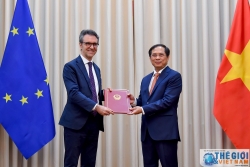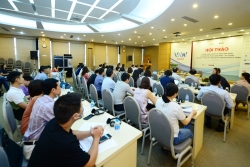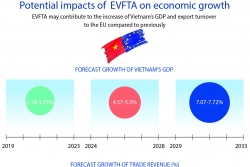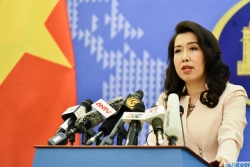
Ambassador Vu Quang Anh: Great prosperity and stability from EVFTA
Latest
| TIN LIÊN QUAN | |
| EU to remove tariffs on Vietnamese tuna once EVFTA trade deal takes effect | |
| EVFTA is not a 'magic wand' if businesses can't overcome obstacles: VCCI official | |
 |
| Ambassador Vu Anh Quang visited Vietnam's booth at the 27th annual Brussels Global Seafood Exhibition in the Kingdom of Belgium in May 2019. (Photo: VNA) |
H.E. Vu Anh Quang, Ambassador Extraordinary and Plenipotentiary of Vietnam to the Kingdom of Belgium, Grand Duchy of Luxembourg, Head of the Vietnamese Delegation to the EU, commented on the challenges and complexity as well as the benefits and opportunities from the EVFTA.
Can you share with us the reaction of EU countries to the National Assembly of Vietnam’s ratification of the EVFTA?
EU countries have long waited for the Vietnamese National Assembly to ratify the EU-Vietnam Free Trade Agreement (EVFTA) and the EU-Vietnam Investment Protection Agreement (EVIPA). As both parties stand much to gain from these agreements, EU countries have made significant efforts to implement both agreements.
The EU’s expectations of the agreements have been high since negotiations on the terms of the EVFTA and the EVIPA came to an end. EU member countries had urged the relevant agencies to facilitate internal procedures towards the signing of both agreements. On June 25, 2019, Finance Ministers across all EU member countries approved the signing in Brussels, with a consecutive signing in Ha Noi on June 30.
| Read more |
 Vietnamese goods entering EU not straightforward under EVFTA Vietnamese goods entering EU not straightforward under EVFTA |
The European Parliament (EP) immediately began the ratification process following the signing of these agreements; having drafted reports, held hearings and discussions, with the participation of European companies and businesses involved. Both agreements had received a high level of approval from both Members of the EP and the general public. On February 2, 2020, news of the EP’s approval of both EVFTA and EVIPA was widely broadcasted. On March 30, all 27 ministerial-level members of the Council of the European Union commenced the final legislative step to ratify the EVFTA.
With ratification procedures on the EU side nearing completion, the news of the National Assembly of Vietnam’s imminent ratification and eventual implementation of both EVFTA and EVIPA was well received by the EU.
How important is the EVFTA to both Vietnam and the EU, especially under the heavy impacts that the COVID-19 pandemic is having on the global economy?
The EVFTA carries strategic importance to both Vietnam and the EU. It is one of the first new-generation free trade agreements to incorporate sustainable development goals into trade liberalization. Once in effect, the agreement will provide equal benefits for businesses, workers and consumers in both Vietnam and the EU, not just economically, but also politically, socially, and environmentally.
EVFTA presents many opportunities for economic connectivity and cooperation. With 99% of import tariffs between Vietnam and the EU is significantly reduced once the EVFTA goes into effect, Vietnam will stand greater chances to increase its export into the EU market, with over 512 million consumers, a GDP that accounts for 22% of the world’s total, and an annual average personal income of 36,580 USD.
EU businesses and companies will also benefit greatly from a Vietnamese market with over 90 million consumers, particularly when it comes to products that the EU holds an advantage, such as machinery and equipment, high-quality consumer products, or regional agricultural produce.
Investments from the EU to Vietnam are also expected to rise, especially investments in high-tech industries, clean energy, automation, logistics, banking and finance,...
The Ministry of Planning and Investment of Vietnam predicts that export flow from Vietnam to the EU will increase by 42,7%, with a rise of 4,6% in GDP by 2025 as a result of the EVFTA. The agreement will provide the necessary critical framework and conditions for Vietnam to restructure its economy and growth model towards a more diverse and sustainable outcome.

| Vietnam notifies EU of its ratification of EVFTA, EVIPA |
The EVFTA will solidify EU political and economic prominence in the Asia-Pacific region and help Vietnam promote its comprehensive and strategic partnership with the EU, an important economic and political center of the world. Politically, the agreement will strengthen bilateral relations and overlapping interests between Vietnam and EU member countries, allowing both sides to diversify its partners to avoid being too dependent on one or a small number of markets, in the context of the complicated and unpredictable global economic and geopolitical situation.
The ongoing COVID-19 pandemic is affecting every economy around the world, exposing the global supply chain’s vulnerability. Therefore, big economies such as the EU will have to adjust its supply chains to avoid being too reliant on a single economic partner.
As such, together with the Comprehensive and Progressive Agreement for Trans-Pacific Partnership (CPTPP), the EVFTA will enable Vietnam to reposition itself in the global supply chain, further participate and play a larger role in the global production network, in order to elevate its position in the global supply chain – a critical breakthrough for the country.
What are the opportunities that the EVFTA will present once it goes into effect? How should we adapt and overcome the challenges at every stage of the implementation process, in order to make the most out of the EVFTA?
The most obvious benefit of the EVFTA signing is the EU market being open to Vietnamese exports since tariffs on 99.2% of exported goods will eventually be reduced to 0% throughout the EVFTA implementation process.
Soon as the EVFTA goes into effect, tariffs on 84% of Vietnam’s exports to the EU, which accounts for 71% of the total export value, will be reduced to 0%. Forward seven years, tariffs on 99.2% of the products, or 99.7% of the total export value from Vietnam to the EU, will be cut entirely, while the remaining 0.3% will be given tariff-rate quotas (TRQ), allowing for 0% import taxes (within quota).
Thanks to the EVFTA, by 2027, nearly 100% of Vietnamese exports to the EU will no longer be subjected to taxation, which shows the highest level of confidence and trust between trade partners; ever more significant as the EU is one of the two biggest export markets for Vietnam.
A wide range of main Vietnamese export will benefit from the EVFTA upon entering the EU market, either immediately after the agreement goes into effect or during the implementation process, namely agricultural products, fish and seafood, textile products; manufacturing sector and service industry.
| Read more |
 Businesses seek to optimize opportunities from EVFTA amid COVID-19 Businesses seek to optimize opportunities from EVFTA amid COVID-19 |
Vice versa, Vietnamese consumers will also benefit from this agreement when 65% of EU products will exempt from import taxes right after the agreement goes into effect.
With the right preparation, Vietnamese export-import businesses will be able to seize the opportunities and reap the economic benefits that the EVFTA presents. Businesses should research the EVFTA tariff reduction process in the relevant sector and period, formulate medium- and long-term business plans, in order to successfully enter the EU market.
Vietnamese businesses need to raise the product standards and exports quality to meet the EU’s demands, familiarize themselves with the EU laws and regulations of the EU, including technological barriers, Rule of Origin of products, regulations on trade and geographical indication (GI), customs procedures,... to reduce possible trade risks.
Your Excellency, what other predictions do you have for Vietnam and the EU during the process of implementing the EVFTA?
Both the EU and the WTO consider the EVFTA to be a new-generation FTA, a more comprehensive agreement that incorporates factors such as social, environmental and labor rights along with sustainable development goals. This is the highest level of commitment Vietnam has made in a trade agreement so far.
The benefits and opportunities from the EVFTA will always go hand in hand with the risks and challenges. For example, economically speaking, Vietnamese businesses will have to contend with EU’s rules and regulations including trade safeguards, Rule of Origin, the geographical indication of products, intellectual property rights, with the biggest challenge being the “Trade and Sustainable Development” regulations, in particular clauses regarding labor and socio-environmental standards.
The Vietnamese Government and Party, as well as the relevant ministries and agencies, are fully aware of these challenges during the EVFTA negotiation and ratification process. Vietnam has taken the necessary initiative to meet EVFTA’s terms and conditions.
For example, in November 2019, the National Assembly of Vietnam adopted the new Vietnam Labor Code with new provisions in accordance with basic criteria set out by the International Labor Organization (ILO); Vietnam has ratified 6 of the 8 fundamental conventions of the ILO regarding labor rights and principles, and are in the process of joining the other 2. The Vietnamese government has also shown its resolve to meet European Council recommendations for removing its yellow card on Vietnam for illegal, unreported, and unregulated fishing (IUU).

| Potential impacts of EVFTA on economic growth |
Looking back at the process of advocating the EU’s ratification of the EVFTA, do you have any comments on Vietnam’s international integration process?
The EU is not a single country but an alliance of 27 individual nations with the highest level of internal economic and political ties. The EU organizational structure and decision-making process are very complex. Negotiation being finalized between Vietnam and the EU doesn’t guarantee that all 27 of its member countries along with the EP, which consists of 705 members from 27 countries with different political ideas and agendas, will agree to sign and ratify this agreement.
The year 2019 also happens to be an election year in all of the EU’s political bodies. The new EP was elected in May 2019, replacing 62% of its cabinet members, whose new ideology of nationalism, protectionism, anti-globalization and anti-free-trade have festered inside the EU, gaining popularity and support. Some of the agreements that the EU has finished negotiating was put on hold, neither signed nor ratified.
Facing this situation, the Vietnamese Government along with the relevant ministries and agencies, under the leadership of the Prime Minister and Chairwoman of the National Assembly of Vietnam, have acted decisively in advocating for the EU support and its member countries to sign and ratify the EVFTA. As such, the EP had voted to ratify the agreement while the National Assembly of Vietnam was still going through the process.
In total, the EVFTA, Vietnam’s election as a non-permanent member of the United Nations (UN) Security Council for 2020-2021 with a record number of votes, as well as the position of ASEAN Chair, are among the most significant diplomatic achievements in recent years. The EVFTA remains the biggest and most comprehensive free trade agreement we have ever signed, the first new-generation free trade agreement the EU has ever signed with a developing country, thus elevating Vietnam international standing and generating a breakthrough in our global integration process.

| Nikkei: EU is keen for Vietnam to restart flights as EVFTA takes effect Japanese news publication Nikkei Asian Review released an article detailing the EU’s desire for Vietnam to resume international flights once the European Union - Vietnam ... |

| Vietnam ready for EVFTA, EVIPA enforcement: Spokeswoman Vietnam is now ready for implementing the EU-Vietnam Free Trade Agreement (EVFTA) and the Investment Protection Agreement (EVIPA), Spokeswoman of the Foreign Ministry Le Thi ... |

| Capitalizing on EVFTA sure to be a challenge: Insiders The EU-Vietnam Free Trade Agreement (EVFTA) is expected to provide a host of opportunities to Vietnamese enterprises to bolster their exports, but they must also ... |

















